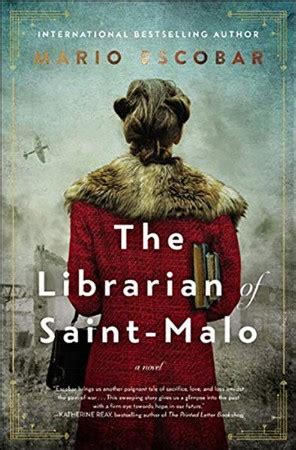|
Summary Libraries are being ransacked. France is torn apart by war. A French librarian is determined to resist. Told through smuggled letters to an author, an ordinary librarian describes the brutal Nazi occupation of her small coastal village and the extraordinary measures she takes to fight back. Saint-Malo, France: August 1939. Jocelyn and Antoine are childhood sweethearts, but just after they marry, Antoine is drafted to fight against Germany. As World War II rages, Jocelyn uses her position as a librarian in her town of Saint-Malo to comfort and encourage her community with books. Jocelyn begins to write secret letters smuggled to a famous Parisian author, telling her story in the hope that it will someday reach the outside world. France falls and the Nazis occupy Jocelyn's town, turning it into a fortress. The townspeople try passive resistance, but the German commander ruthlessly begins to destroy part of the city's libraries. Books deemed unsuitable by the Nazis are burnt or stolen, and priceless knowledge is lost. Risking arrest and even her life, Jocelyn manages to hide some of the books while desperately waiting to receive news from her husband Antoine, now a prisoner in a German camp. Jocelyn's mission unfolds in her letters: to protect the people of Saint-Malo and the books they hold so dear. Mario Escobar brings to life the occupied city in sweeping and romantic prose, re-creating the history of those who sacrificed all to care for the people they loved. Positives This is a beautiful story that went none of the places that I expected it to. It rejected most tidy standards for the historical novel market, particularly in Christian fiction, and told a powerful story regardless of where it led. It doesn’t take the easy way out, but rather presents a meaningful picture of reality. (This story is also based on true events as well, which adds a whole new layer to it.) I was curious going in when I noticed it was a female lead written by a male author. (Not anything against male authors, but I had just come off of a very poorly written novel by a male author who hadn’t done his research.) Mario Escobar did an amazing job keeping the thoughts and perspectives true to female experience. Much applause. Plus, can I just say how cool it was when they would talk about Spain and such, and to know that this guy actually knows what he’s talking about, lives it day in and day out? I felt like it added such a neat element to the story. I’d love to see more authors of different ethnicities telling their stories in the Christian fiction market. Negatives This book does include infrequent language (four instances total, three of which appear in one chapter, Chapter 5 to be specific). I found the book at my church library where the words had been inked out. Due to it being told in a letter format, I didn’t feel like I really got in Jocelyn’s head or really got to know her. I was reading a compelling story, to be sure, but I didn’t have a connection to the characters. I would have loved to see something more along the lines of Amy Lynn Green’s Things We Didn’t Say, which does a fabulous job connecting the reader to the character despite being told through letters. Conclusion What The Librarian of Saint-Malo lacks in character connection, it makes up for in powerful story.
0 Comments
Leave a Reply. |
Rachel's Reads
Hi there! Rachel again. Check out this section for book reviews and cover reveals of some of my favorites! Archives
June 2023
Categories
All
|

